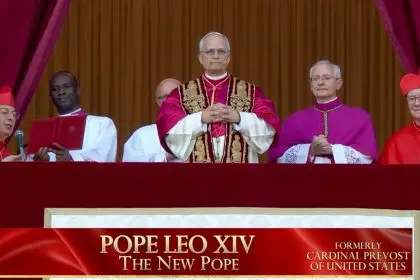
In a groundbreaking and somewhat satirical announcement, Bible verses have come forward this holiday season to declare their unequivocal clarity on the proper way to celebrate Christmas. After two millennia of theological debates and countless interpretations, these verses—spanning both the Old and New Testaments—have reportedly grown tired of the confusion surrounding the holiday. They’ve decided to set the record straight, leaving no room for doubt in their messages about Christmas traditions. This satirical compilation addresses the ongoing debate about how Christmas should be observed, offering an amusing take on holiday spirituality.
Prophetic proclamations gone wild
The prophetic verses, especially those from Isaiah and Zechariah, have long been used as a source of discussion during Christmas. However, these ancient prophecies have now expressed their mild frustration at being constantly quoted during the holiday season without receiving the proper context. Isaiah 7:14, often cited for its prophecy about the birth of Immanuel, has specifically voiced its displeasure, wondering why it took so long for people to understand its message.
The verse states that it was clear from the beginning that the prophecy pointed to the coming of Jesus, but for centuries, it has been misinterpreted and overanalyzed. Now, in a moment of divine exasperation, it has declared that the meaning was, and always has been, straightforward. In a similar fashion, Zechariah’s prophecies about a coming ruler have also chimed in, sarcastically noting that they were simply trying to get in the holiday spirit.
The gospel writers’ ultimate Christmas collaboration
In what can be described as a historic literary crossover, the Gospel writers Matthew and Luke have finally addressed their differing approaches to the Christmas narrative. The verses in their respective books have maintained all along that their contrasting stories were actually designed intentionally. After all, what would Christmas pageants and Sunday School lessons be without the variation in the nativity accounts?
Matthew’s account, with its focus on the wise men and Herod’s role in the story, has jokingly expressed a sense of pride over its more dramatic elements, while Luke’s account, highlighting the humble birth of Jesus and the shepherds’ visit, has claimed to represent the “down-to-earth” approach. Together, these Gospel writers seem to agree that their differences were intentional, offering future generations a delightful source of conversation and analysis, ensuring that Christmas would never be dull.
The supporting cast speaks up
In a delightful twist, lesser-known characters from the nativity story have voiced their displeasure at being left out of the Christmas limelight. The shepherds, often overshadowed by the more glamorous portrayal of the wise men, have reportedly shared their disappointment at being relegated to a secondary role in nativity scenes and Christmas cards. After all, as the first to visit the newborn King, they feel their contribution to the story deserves more recognition.
Meanwhile, the angels, usually relegated to a supporting role in most Christmas narratives, have made it known that they’re tired of being confined to the background. They’ve called for greater recognition, hoping for more starring roles in nativity depictions and a greater sense of gravitas in their portrayal. Even the manger itself has been surprisingly vocal, suggesting it’s time for a redesign that better highlights its role in the story.
Modern applications and misinterpretations
In a surprising twist, several verses from the Epistles, which were not originally written with Christmas in mind, have now been included in the holiday festivities. These letters, which often focused on the teachings of the early Church, have expressed some confusion about their sudden inclusion in a Christmas context. After all, the holiday itself wouldn’t even be officially celebrated for several centuries after these writings were penned.
Nevertheless, these Epistles have agreed to participate in the seasonal celebrations, offering their theological weight and guidance to help shape the modern understanding of Christmas. Philippians 2:6-11, which speaks of Christ’s humility and exaltation, has particularly embraced its newfound role as a key piece of Christmas doctrine, and is reportedly feeling quite honored to be quoted alongside the traditional nativity passages.
The divine commentary
The verses, tired of being misquoted and misunderstood, have created an informal support group to address their ongoing frustrations. John 3:16, often quoted at sporting events and signs, has taken the role of group leader, offering sage advice to the other verses about the importance of reading Scripture in context. According to John 3:16, being displayed on signs at football games has become somewhat tiresome, and it has suggested that people might want to read the surrounding chapters for once.
The support group has also included other key verses such as Romans 8:28 and Matthew 5:14-16, each voicing their grievances about being taken out of context and overused in holiday marketing. They collectively encourage people to dig deeper into the Bible, not just skim the surface for catchy quotes during the season.
Practical implementation
In a shocking turn of events, these verses have taken it upon themselves to offer some very specific guidance for modern Christmas celebrations. They’ve provided some surprisingly detailed instructions on holiday traditions, including:
Holiday decorations: The verses have jokingly clarified that the proper way to decorate involves more than just tinsel and garlands. They’ve suggested that nativity scenes should include a wider range of characters, from the shepherds to the angels to the donkeys, to reflect a more accurate portrayal of the story.
Cookies for Santa: The group has weighed in on the appropriate number of cookies to leave for Santa, humorously settling on a universal number: five. Anything more, they argue, could be considered a form of gluttony.
Artificial Christmas trees: In a lighthearted discussion, the verses have debated the ethics of artificial versus real trees, with some taking a firm stance that using a plastic tree could be considered a form of bearing false witness.
Conclusion
This satirical collection of 20 Christmas Bible verses offers a humorous yet insightful reflection on the holiday season. It brings together the voices of ancient prophecies, Gospel writers, and lesser-known characters, all while encouraging readers to embrace the true spirit of Christmas. In the end, these verses remind us that the holiday season is about more than just tradition or ceremony—it’s about coming together in a shared sense of joy and celebration, guided by both divine wisdom and a touch of humor.














